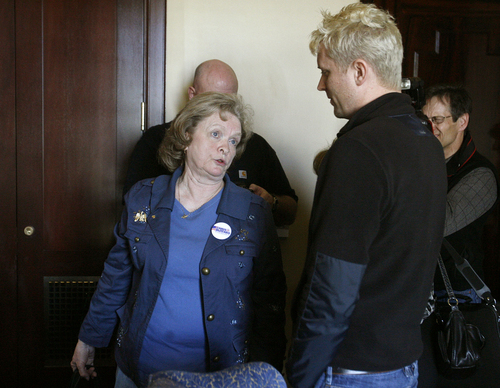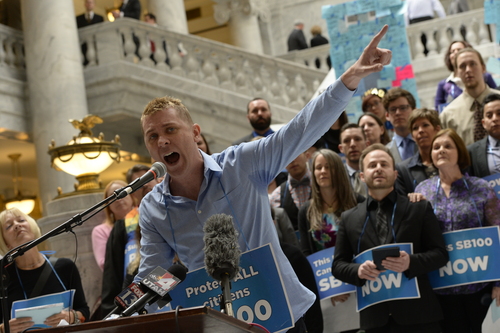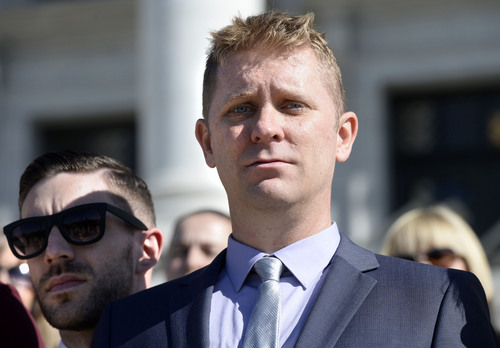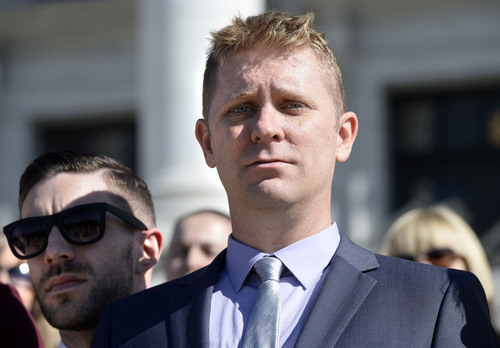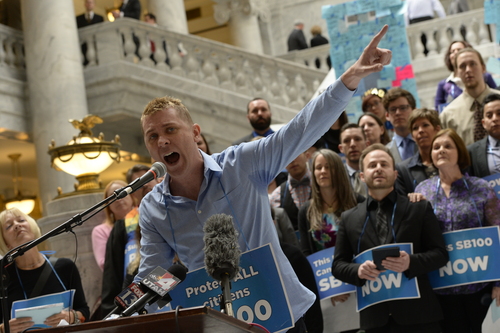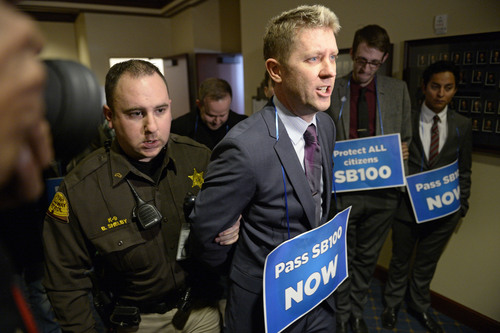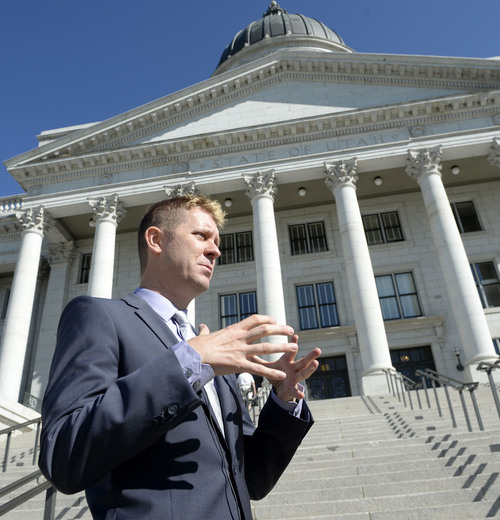This is an archived article that was published on sltrib.com in 2014, and information in the article may be outdated. It is provided only for personal research purposes and may not be reprinted.
Last legislative session, Troy Williams was escorted out of the Utah State Capitol in handcuffs.
Salt Lake's "gay mayor" was protesting the Legislature's refusal to hear a bill that would outlaw discrimination against people based on sexual orientation. For Williams, who for years has been known for his vocal — and sometimes radical — activism, it was just another day.
But going forward, Williams said, he'll be trying to trade in the handcuffs for handshakes and build bridges with legislators who are less than fond of his brash style.
On Friday, Williams was named the new executive director of Equality Utah, replacing Brandie Balken as head of the gay-rights group.
"I have learned that none of us alone and angry is as powerful as the whole of us united by love and hope," Williams said at his address at the Equality Utah Allies Dinner on Friday. "This movement belongs to all of us. Together we have the opportunity to shape the future of this state. Our challenge now is to model for the rest of Utah how we can all co-exist; Republican, Democrat, Mormon, atheist, transgender and gay. We all belong to the same human family. Our commonalities far outnumber our differences."
But Williams' appointment raised eyebrows and questions among lawmakers who associate Williams with a particular, and often divisive, brand of activism.
Sen. Steve Urquhart, R-St. George, decried Williams' stance that although Urquhart was the first Republican in the Legislature to sponsor an anti-discrimination law, his conservatism kept him at odds with the lesbian, gay, bisexual and transgender community.
"When someone declares war on anyone and everyone holding a political ideology, it can be expected that the people with that political ideology understand that that person considers them enemies, and that is just a significant issue to deal with when a significant majority of the state and the Legislature holds that ideology," Urquhart told The Salt Lake Tribune.
"I'm going to have to assess what [Williams' appointment] does to chances of passing nondiscrimination legislation this session," he said. "And, more broadly, I need to assess how it would affect my ability to advance all of my legislation and all of my causes, to be closely affiliated with someone who has been so antagonistic to conservatives and Republicans."
This response isn't news to Williams. In fact, Williams acknowledged that his reputation will likely influence his reception at the Capitol, but said he hopes legislators will give him a chance to demonstrate his diplomacy.
"I hope Utah legislators who know me will see someone who has a deep passion for gay and transgender rights," Williams said. "Our end goal is nothing less than full legal equality in all areas governed by civil law, and we will continue forward to that end until it happens."
Williams was raised Mormon. He was a missionary. As a young man, he interned at the Utah Eagle Forum and trained under the guidance of his mentor, Gayle Ruzicka.
Ruzicka, widely considered among the most powerful voices for conservative values in the state, said in a 2010 interview that she has harbored a fondness for her former intern.
When the two run into one another in the halls of the Capitol, Williams said, they hug.
"Gayle had no idea she was training the future director of Equality Utah," Williams said. "Obviously we're in very different places, ideologically, but I genuinely respect her passion to her cause, and I've tried to carry that into my own life."
Williams didn't come out as gay until his late 20s.
Since then, Williams has been among the highest profile LGBT activists in the state. He was featured prominently in the movie, Prop 8, a documentary about the involvement of The Church of Jesus Christ of Latter-day Saints in a ballot measure seeking to ban same-sex marriage in California.
He's been a producer at KRCL community radio for the past 10 years, hosting a program coined "RadioActive." In 2009, Williams ended up on the Stephen Colbert show during a send up of the LDS Church's kissing ban.
Last year, he was one of 13 activists who blockaded a legislative committee meeting and tried to confront Senate President Wayne Niederhauser, R-Sandy, over Senate Republicans' refusal to allow a statewide anti-discrimination ordinance to have a legislative hearing.
This varied — and uniquely Utah — experience is what prompted Equality Utah board members to consider Williams so well-suited for the position of executive director, said Chairman Cliff Rosky.
"Becoming executive director of Equality Utah gives Troy an opportunity in some cases to introduce himself, and in others, to reintroduce himself," Rosky said. "This is someone who got arrested at the Legislature last year and wants to now reach out to people of all walks of life — people who are actively LDS, who are Republican, who don't see eye to eye with him, to bring the whole community together. That sends a powerful message about how things are changing in Utah."
The image of Williams as an in-your-face activist may be a hard one to shake for some legislators.
But Niederhauser said he has hope for Williams and his tenure as the director of Equality Utah.
"I guess I could be wrong but I have always respected Troy," he said. "As far as I'm concerned I can work with just about anybody as long as we maintain a civil and respectful dialogue."
Rosky added that those who may worry about the organization's new director — or direction — aren't giving either enough credit.
"Equality Utah is an entire organization whose strategy is formed in collaboration with its board and staff — it's more than just a face," he said. "But I also think that if there are people out there who are concerned about Troy and his approach, they will be very pleasantly surprised by Troy's commitment to building bridges and reaching across the aisle to bring people together."
As Williams takes the helm of Equality Utah and heads toward another legislative session, where, he said, he will work to bring LGBT issues to the forefront, he will also be fighting another battle — in the courtroom.
Williams and the 12 others who make up the so-called "Capitol 13" announced last month that they intend to fight charges of disturbing a legislative meeting, a class B misdemeanor punishable by up to six months in jail.
Twitter: @Marissa_Jae, @robertgehrke


